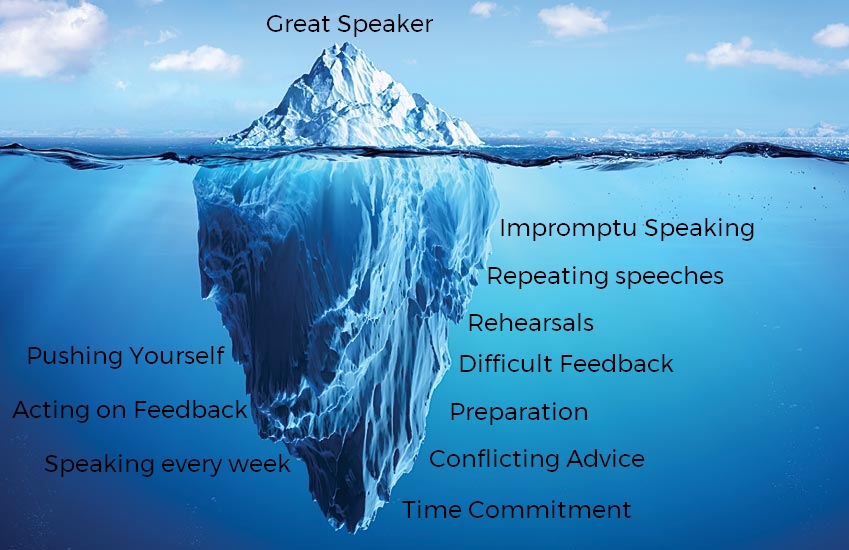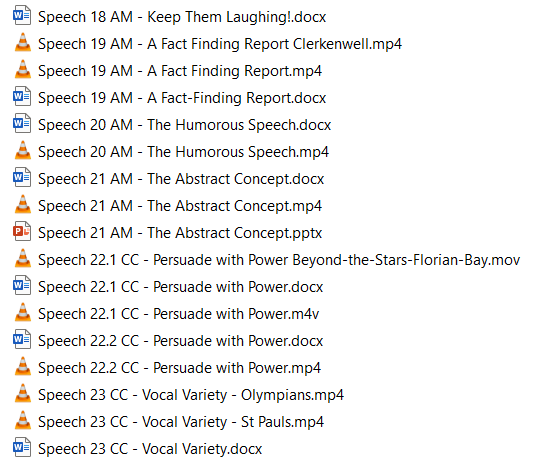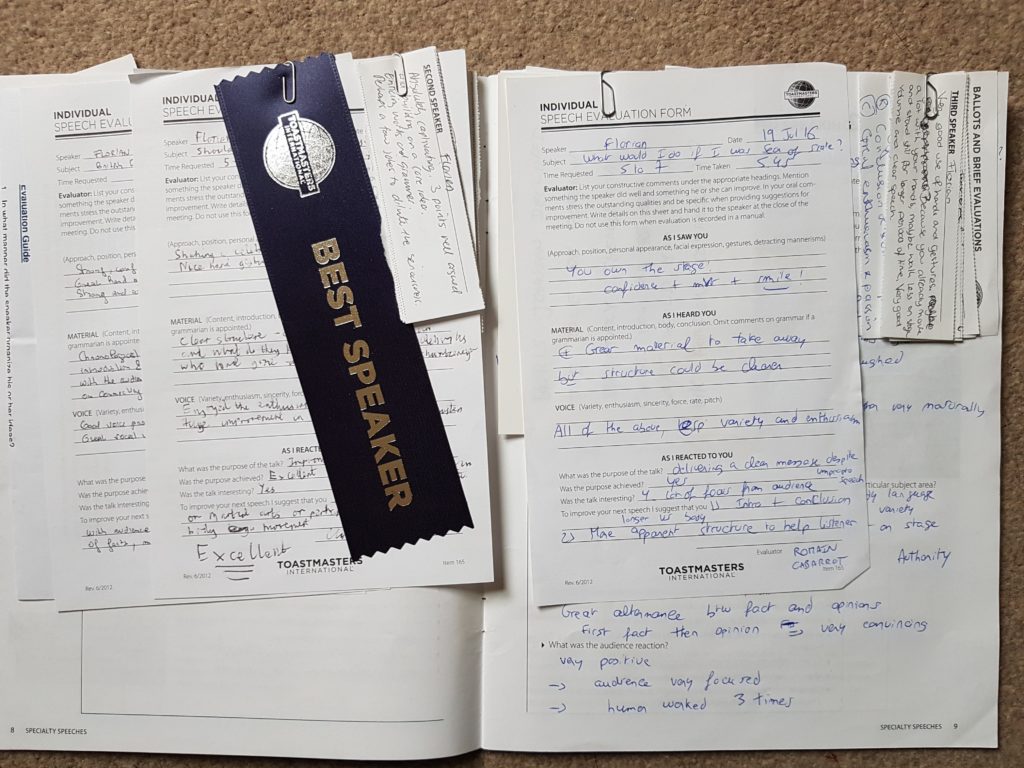“Over 90% of people aren’t serious about developing themselves.” This is what a past World Champion of Public Speaking said to me in passing some months ago. This remark may seem negative but I think its entirely true. I have often seen aspiring speakers in Toastmasters who had high goals and aspirations but never lived up to them for various reasons. Many ingredients come together to turn someone into a great speaker. The good news is that we can control most of them. The bad news is it’s not that easy.

Preparation is the key to success
This preparation takes many different forms. Crafting the speech or presentation is one of them. Rehearsing the contents and trying out different things is another one. Finally, there is the physical preparation itself on the day.
It is surprising how long writing a simple 10mins speech can take. Writing the c1,200 words this represents is the easy part. Researching the contents, playing around with sentences and word usage can be far more time-consuming. The more experience you’ll gain as a speaker, the quicker the speechwriting process will become. You might even be able to reach a point where just having an outline and a few bullet points are enough. However, preparing contents will still be necessary. Don’t be this speaker who turns-up on stage with a couple of hastily written and disorganised A4 pages. This is a sure-fire way to learn nothing. Write your speeches in advance, store them and file them. The worse than can happen is that you’ll have content ready to be reused again!

Another aspect of preparation is planning your public speaking journey in advance. Toastmasters can be a great platform to learn and practice public speaking. There are however a few strings attached to Toastmasters. The first line of the Toastmasters promise says it all “to attend club meetings regularly.” By turning up to meetings once a week, you’ll learn by doing speeches and roles and by observing others. Some new members have high aspirations, but fail to turn up to meetings or put themselves for something and don’t turn up. Later some even blame the club for not supporting them enough. This isn’t the right attitude required to become a great speaker and no amount of “positive thinking” will change this. Instead, plan ahead, be consistent and deliver on your promises.
Be prepared for tough feedback
You’ve decided to commit the time and to play the journey ahead. This is great but I’ve got some more bad news for you. Be prepared to fail, make mistakes and to get out of your comfort zone.
The speech you’ll deliver on stage will almost always be different than the one you wished you had delivered. Differences will reduce over time, but subtle differences will always remain. Sometimes you’ll end up doing better than you expected. But at other times you’ll do worse than you expected. This is where feedback from other audience members will matter a lot. Additionally, filming yourself speaking can give you really good feedback on your performance. Beware though, your harshest critic is yourself!

I learned a lot from a few experiences where my speeches failed. The 2017 YGN Public Speaking Competition taught me that not having a clear objective for my speech would only lead my audience astray. An attempt at a very humorous speech in 2015 bombed when most audience members couldn’t get my jokes, let alone understand words like ‘tenement’. A few months ago, a speech I delivered wasn’t as impactful as it could have been due to limited pre-speech mental preparation.
Never be afraid of though feedback and take your time to digest it. Some of it for me included taking steps to improve my English pronunciation, which can make a big difference for speakers who have English as a second language. Remember though as if you want to become a great speaker, your content matters just as much as your delivery. The most over the top delivery may not be able to compensate for a lack of purpose in your speech.
You need time to become a great speaker
I often see keen new Toastmasters members who want to become great speakers, but at the same time only want to do prepared speeches. This both isn’t the right attitude to display. But also obviates the fact that becoming a greater speaker takes time.
It took me a solid year of speaking before I was able to confidently speak without any notes. It took me two years before I was able to let go of repetitive hand movements on stage. Now after six years of regular speaking, I’m finally able to master eye contact in the way I want. I cringe when I watch the recordings of my earlier speeches and, “was I really that bad” is the first thing that goes into my mind. Thousands of hours of learning, preparation and speaking separate me from these earlier speeches. Moreover, I’m still learning new things every time I go on stage.
Speaking as often as you can, may accelerate the time it takes to achieve mastery. But only to an extent. Why? Because it increases the risk of repeating past mistakes who then become embedded. Something very few speakers do, is to spend the time to review any feedback that they receive. It’s a tedious and boring process that can nevertheless provide very valuable insights. Ignore it at your own peril!
What can accelerate your speaking journey is to have a strong mentor or coach. I received extensive coaching from a former opera singer a few years ago. He also made me sit a 3h written exam in public speaking. This exam taught me more about the foundations of public speaking than delivering speeches could.
If you are looking for a boost on your speaking journey get in touch with me and I’ll happily coach you.
Dear Florian,
Thank you for articulating your thoughts and experiences on the journey of public speaking.
Regards,
Ken
What was the 3 hour exam in speaking? Where do you take it? Can we get a copy?
Hello Serena,
I did this exam through New Era Academy. The process is that someone would typically coach and teach you over a number of weeks ahead of the exam. Then your teacher would pay the exam fee to NEA and present you for your exam. The content of the exams has changed somewhat since 2016/17 when I did mine but it is still mostly the same:
https://www.neweraacademy.co.uk/exams/diplomas/
If you want more information on the exam itself, preparation etc. Please get in touch with me by contacting me.